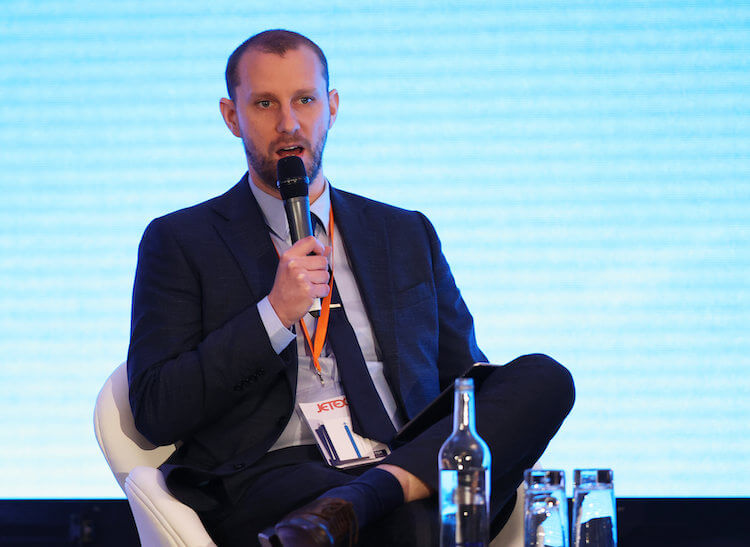E for engagement with Valour Consultancy
This is a special feature from PAX Tech's 2022 Seating, IFE & Connectivity issue, on page 16.

Craig Foster, one of three founders of Valour Consultancy
The UK-based consulting firm Valour Consultancy boasts a client list in three figures and is led by a team of close friends who share a decades-long interest and expertise in inflight entertainment and connectivity (IFEC).
The company keeps its fingers on the pulse of the IFEC and cabin technologies markets, issuing regular reports on the number of installations and publishing think pieces that help the industry plot its way for the future. PAX Tech asked Valour’s Craig Foster what were three of the big highlights for 2021 and what they predict will be the three big stories talked about when 2022 ends.
Foster is one of three co-founders that form the core of the market intelligence and research company which started in 2012 with friends and colleagues Joshua Flood and Daniel Welch.
The three honed their experience and knowledge of the industry before forming the company. Their time together started at a market intelligence provider called IMS Research. They first began looking at transportation connectivity for maritime applications. IMS was acquired by another company and moved out of aerospace research. This left a market niche for detailed, comprehensive research – and a space for the three founders to begin amassing a client list. Now, that roster includes airlines, satellite operators, connectivity service providers, equipment vendors and a host of other companies looking for a thorough understanding of the IFEC market.
“We allow companies to shape the research,” says Foster. “When we initiate a project, we always go out to the market and say, ‘Does this meet your needs or is there additional content that you might like to see.’”
The company’s efforts do not end there. After a report is delivered, communication continues if the client has follow-up questions.
Looking back and looking ahead
Few would argue with Valour’s contention that the top story of 2021 was the purchase of Inmarsat by industry competitor Viasat for US$7.3 billion. When completed, the buyout will create a huge vendor with a share that is nearly one-third of the market and nearly two-thirds of the commercial aircraft under contract to receive IFC in the years to come.
“It is an absolutely massive deal if that goes ahead,” said Foster. “Not just in commercial aviation, but in maritime and business aviation as well.”
The next big development in 2021 was the industry’s accelerated move toward digital transformation. IFEC vendors have adopted a more open platform approach to meet the demands of airlines needing buy-on-board capability and in-seat ordering.
“So, the E in ‘IFE’ is not necessarily about watching videos or movies anymore,” said Foster. “It is about passenger engagement. And that trend was taking place before the pandemic but it has accelerated because obviously airlines are looking to generate more revenue streams and become more lean and more efficient.”
Valour’s third big takeaway of 2021 has a regional focus. North America has long been the home of early adopters for IFC; but why is the region still an area for growth and expansion?
Foster says it is because the most saturated IFC market in the world (with 80 percent of the aircraft now wired for Wi-Fi) is ready for installation of the next generation of technology.
“Despite the fact that there is a lot of IFC out there in North America, it’s sort of phase two,” Foster says. “That will lead potential suppliers to fight for a slice of the pie.”
And in 2022 there will be no shortage of potential providers hunting for potential slices. Among them are some of the most well-known companies in the world.
Low-earth orbit (LEO) satellite operators will take an important place in the industry in 2022, Valour says. OneWeb, Telesat and Elon Musk’s SpaceX will continue with satellite launches. Strategies are being developed for go-to-market products with OneWeb partnering with IFC service providers and geostationary satellite providers, while SpaceX will likely tout its abilities directly to the airlines. In 2022, Foster predicts that one of the companies will probably announce an airline customer.
Related news moved in late March when OneWeb and SpaceX agreed to continue OneWeb satellite launches. The first launch is anticipated in 2022 and will add to OneWeb’s total in-orbit constellation that currently stands at 428 satellites, or 66 percent of the fleet. OneWeb’s network will deliver high-speed, low-latency global connectivity.
Linked to the rise of LEO operators is the development of electronic steered antennas (ESA). Valour sees the technology taking a notable leap forward in 2022 and in years beyond. Testing and partnerships will continue with some the large players. However, in the near term, hybrid mechanical developers like Thinkom, have a product that can work with LEO and GEO satellites and on smaller airframes such as regional jets, the majority of which have not been able to take advantage of satellite capacity because of the bulkier antennas.
“Thinkom could have a continuing role to play in the market and I expect they will be announcing further partnerships, and possibly with the OEMs as well on the line-fit side which is becoming more and more important,” Foster says.
Another top story for 2022 is the industry consolidation that has been predicted for some time. While Foster says that the Valour was not thinking of “horizontal” consolidation, like the Viasat purchase of Inmarsat, the company sees the large players in the industry increasing their collective share in the IFC base and backlog.
Not only will companies merge, but Foster sees a merger of technologies as well. Open software platforms like the one developed by Airbus will help further blur the lines between IFE and IFC. Instead of two distinct categories, IFEC will emerge as aircraft cabins with the software capability to handle any type of entertainment and connectivity product will mean greater flexibility of choices in the future.

